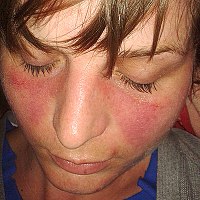
Photo from wikipedia
Background: COVID-19 infection poses a serious challenge for immune-compromised patients. This is likely due to a combination of immune dysfunction, immunosuppressive therapy and excess co-morbidities. Little is known about the… Click to show full abstract
Background: COVID-19 infection poses a serious challenge for immune-compromised patients. This is likely due to a combination of immune dysfunction, immunosuppressive therapy and excess co-morbidities. Little is known about the impact of Coronavirus disease 2019 (COVID-19) in patients with inflammatory autoimmune systemic diseases. Objectives: The aim of this study is to describe clinical characteristics of patients with autoimmune systemic diseases and COVID-19, and to identify baseline variables associated with a severe infection requiring hospitalization. Methods: A telephone survey investigating the impact of COVID-19 on patients with systemic lupus erythematosus (SLE), systemic sclerosis (SSc), inflammatory arthritis (rheumatoid arthritis, psoriatic arthritis, ankylosing spondylitis), idiopathic inflammatory myopathies (IIM), ANCA-associated vasculitis (AAV) was administered. Data extraction included diagnosis, disease activity status, demographics, disease duration, occupational exposure, adherence to social distancing advise, therapy, comorbidities, and laboratory tests. COVID-19 was classified as definite diagnosis of COVID-19 disease: presence of symptomatic COVID-19 infection, confirmed by a nasopharyngeal SARS-CoV-2 polymerase chain reaction test. Comparisons between patients with or without hospitalization were performed. Results: 512 patients (median age 53,4 ± 14,3 years) with autoimmune systemic diseases (234 IA, 182 SLE, 42 SSc, 31 IIM, 23 AAV) were included in the study. 89 patients (58 woman, 31 men) developed at least one symptom (fever, asthenia, chills, cough, sore throat, dyspnea, chest pain, headaches, arthralgias, myalgias, odynophagia, diarrhea, conjunctivitis, hypo-, ageusia, hypo-, anosmia) of COVID-19 and were PCR test positive. Of patients with COVID -19 infection 54 patients were treated with methylprednisolone, 36 -with methotrexate, 34 -with hydroxychloroquine, 26-with biologics, 10 -with azathioprine, 6 -with cyclophosphamide prior to their COVID-19 illness. Conclusion: COVID-19 is more frequent in the subgroup of patients without therapy with modifying anti-rheumatic drugs, which might play some protective role against the most harmful manifestations of Covid-19. 21 patients required hospitalization -these were more frequently men, older and with comorbidities (cardio-respiratory illness, renal diseases, diabetes mellitus). Male sex, previous coronary and lung disease, serum creatinine level, proteinuria, glucocorticoids use ≥ 5 mg/day, were associated to hospitalization. Patients with inflammatory arthritis do not seen to be at higher risk for infection or a severe course of COVID-19.
Journal Title: Annals of the Rheumatic Diseases
Year Published: 2021
Link to full text (if available)
Share on Social Media: Sign Up to like & get
recommendations!